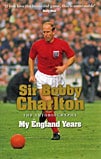 The Autobiography
The Autobiography
by Sir Bobby Charlton
Headline, £7.99
Reviewed by David Stubbs
From WSC 271 September 2009
Following up the first volume of his memoirs My Manchester United Years, this covers the span of Charlton’s international career from 1958 to that anticlimactic moment in 1970, when in his last game for his country he was substituted in the World Cup quarter-final, only to see West Germany overturn a 2-0 lead, taking advantage of Peter Bonetti’s unfeline goalkeeping display.
Charlton indisputably deserves all of the respect heaped upon him as a player and his opinions, reflections and experiences on his playing days for England properly command attention. However, despite a competitive spirit and superconfident aura on the pitch, and a statesmanlike air in retirement, he’s always been somewhat self-effacing, a sometimes maddening characteristic as a narrator. He gives virtually nothing away about his family life, friendships or relationships during this period – it’s all football.
His fellow players are garlanded with praise, not least for their “honesty”, a word which frequently recurs in this text, but these reminiscences are as dirt-free as a pair of freshly dubbined boots. No scores are settled or grievances aired. You can feel his anguish and sense of indelicacy at venturing the half-criticism of Walter Winterbottom that he was perhaps a little donnish and aloof as an England manager. His abiding olde worldeness is evident in his description of the “gaiety” of the street revelries following the 1966 victory. Moreover, his all-time England XI selection contains only one player of remotely modern times – Bryan Robson (“A wonderful heart”). Paul Gascoigne? Too early to say.
Some of the colour of this memoir has a familiar hue about it – James Lawton, chief sports writer of the Independent, ghosts this, as he did the previous volume. Lawton is the man players of a certain generation tend to reach for when it comes to these jobs. He’s also co-written the autobiographies of Nobby Stiles, George Cohen and Ian St John. His cadences are familiar, and it’s not long before unlikely Lawtonisms surface. Recalling the 1966 final, for example: “I return there not as some ageing conqueror spinning out the years, but as a pilgrim who was once shown the light.” Sure, James. Sorry, Bobby.
The combination of Lawton’s florid yet austere syntax and Charlton’s narrative reticence makes for a bit of an unseasoned read as Charlton assesses the relatively poor England international vintage of the late 1950s and early 60s. There are vivid anecdotes – of Pelé, actually screaming the word “Goal!” in a match before he had even connected his foot with the ball and, inevitably, scoring. He recalls a game in the US in which, playing out on the wing on a woefully inadequate pitch, he was required to run across the soil of a pitcher’s mound. The only time he almost boils over is in recalling how England proceeded to the 1962 World Cup quarter-finals after perilously settling for a draw against Bulgaria – Bulgaria! – the folly of which rankles with him till this day.
Come the 1966 tournament and Alf Ramsey’s tenure and the story picks up, along with England’s fortunes. He confirms the image of Ramsey as a clipped martinet but a man of tremendous psychological and footballing cunning, who knew how to get the measure, and more, out of his young charges, who was under no illusion that this was hardly the greatest set of England players but nonetheless were the team whom he guided, star-less and winglesss under his compact 4-3-3 formation, to their greatest triumph.
Charlton’s job that day was one no modern manager would dare ask of a star forward in the biggest match of their lives – simply man-mark an opposing centre-back, Franz Beckenbauer, out of the game. He dutifully and effectively complied, and in so doing showed that while as a character gaiety has never been his strong point, refusing to be a prima donna is a quiet strength.